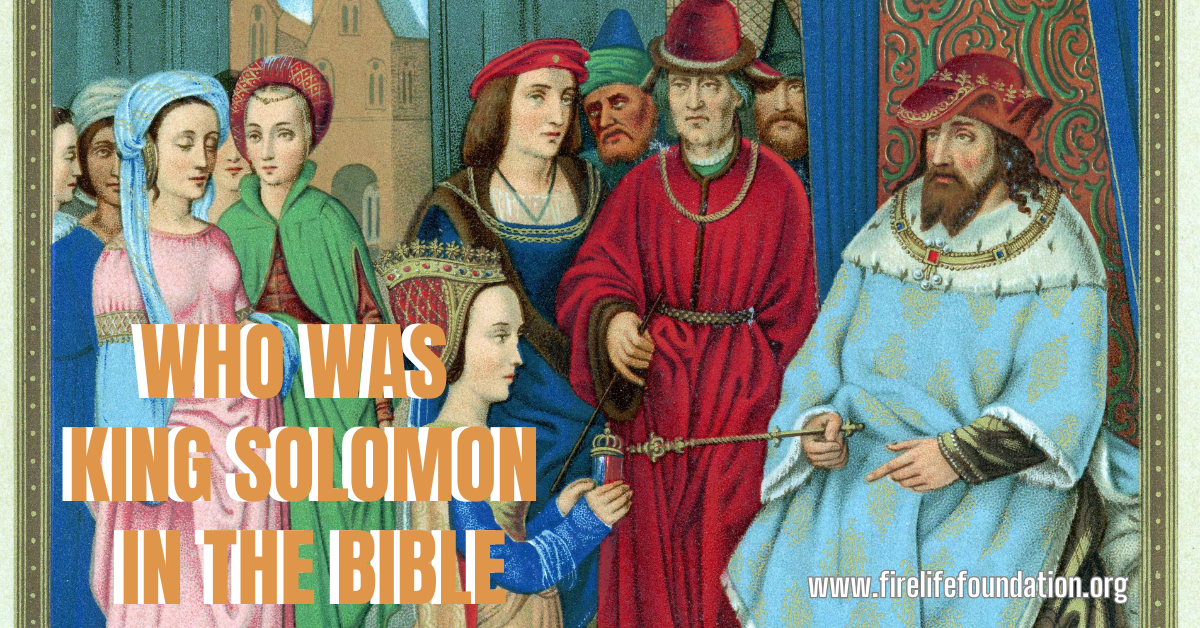Who Was King Solomon In The Bible
King Solomon: Wisdom, Wealth, and Wonders of the Bible
Throughout biblical history, few figures shine as brightly as King Solomon. Revered for his wisdom, opulence, and remarkable accomplishments, Solomon's reign is often regarded as a golden era in ancient Israel. Let's explore the life and legacy of this iconic ruler who left an indelible mark on the pages of the Bible.
Early Life and Ascent to the Throne
King Solomon, known as Shlomo in Hebrew, was the son of King David and Bathsheba. Born in Jerusalem, his early years were marked by divine favor, as he was chosen by God to succeed his father as the ruler of Israel. In his youth, Solomon was renowned for his sharp intellect and discernment, qualities that would later become synonymous with his name.
Following the death of his father, Solomon ascended to the throne around 970 BCE, embarking on a journey that would shape the destiny of his kingdom and etch his name in history.
The Wisdom of Solomon
One of the most famous episodes of Solomon's life is the story of his divine wisdom. According to the Bible, early in his reign, two women approached him with a baby, each claiming to be the child's mother. Unable to determine the true mother, Solomon proposed a perplexing solution – to split the baby in half and give each claimant half of the child. The real mother, in an act of true love, selflessly offered to give up her rights to spare the child's life. Solomon, moved by her compassion, declared her the rightful mother and awarded her custody.
This legendary display of wisdom not only solidified Solomon's reputation as a wise and just ruler but also attracted scholars and dignitaries from neighboring lands, eager to witness his sagacity firsthand.
The Building of the Temple
Another crowning achievement of Solomon's reign was the construction of the First Temple in Jerusalem, also known as Solomon's Temple. This majestic structure served as the spiritual center of ancient Israel and symbolized the presence of God among His people. The construction of the Temple, an architectural marvel, required years of meticulous planning and skilled labor, with contributions from skilled workers and artisans from across the kingdom.
The Temple became a focal point for religious gatherings, festivals, and sacrifices, uniting the people of Israel in worship and devotion. Its grandeur and significance made it a symbol of national pride and the centerpiece of Solomon's legacy.
The Wealth and Prosperity of Solomon's Kingdom
Solomon's reign was marked by unparalleled prosperity and economic growth. His administrative skills and adept governance led to flourishing trade routes and alliances with surrounding nations, resulting in vast wealth flowing into the kingdom. Under Solomon's rule, Israel's influence extended beyond its borders, and it became a sought-after destination for merchants, scholars, and dignitaries.
Moreover, the king's penchant for opulence and luxury was evident in his grand palace, adorned with precious metals, rare woods, and intricate designs. His wealth and affluence were legendary, and he was renowned for his generosity, bestowing lavish gifts upon visitors and dignitaries.
The Darker Side of Solomon's Reign
As the years passed, Solomon's wisdom seemed to wane, and he began to indulge in worldly pursuits. His quest for knowledge and pleasure led him to accumulate numerous wives and concubines, many from foreign lands. This political strategy of forming alliances through marriage eventually took a toll on the kingdom, as some of these foreign wives brought their pagan beliefs and practices, leading to the spread of idolatry within Israel.
Furthermore, Solomon's ambitious building projects and the associated taxation placed a heavy burden on the people, resulting in occasional discontent and dissent.
The End of an Era
Despite the missteps and challenges, Solomon's reign continued to be a time of unmatched prosperity, cultural advancement, and spiritual significance. However, as he grew older, his health declined, and his rule was marred by internal strife and external threats.
Solomon passed away around 931 BCE, leaving behind a kingdom that, despite its former glory, would eventually be divided into two separate entities – Israel and Judah – in the generations to come.
Legacy and Influence
Solomon's impact on the biblical narrative extends far beyond the borders of his reign. His wisdom, as recorded in the Book of Proverbs and Ecclesiastes, remains a timeless source of guidance and insight. His construction of the Temple and the worship practices he established laid the foundation for centuries of religious tradition.
Moreover, the enigmatic and often romanticized figure of King Solomon found a place in various cultural and religious traditions, inspiring countless artistic representations and literary works across the ages.
King Solomon's life is a testament to the complexities of human nature, showcasing the heights of wisdom and the depths of human frailty. His reign remains a pivotal era in the history of Israel, leaving an enduring legacy of wisdom, wealth, and wonder that continues to captivate and inspire generations to this day.
Bible Verse Blanket with Inspirational Thoughts and Prayers
【PERFECT GIFT】:Christian prayer blanket, Inspirational blanket, Religious throw blanket, all inspiring words provide people with strength, hope and enthusiasm for life. The perfect gift for men, women, friends and family.
Perfect gift for Women/Men/Family Soft/Cozy/Beautiful Throw Blanket
Material Flannel
Sizes:" 40”X 50”, 50”X 60”, 60”X 80”
***Disclaimer: As an Amazon Associate, I earn from qualifying purchases

